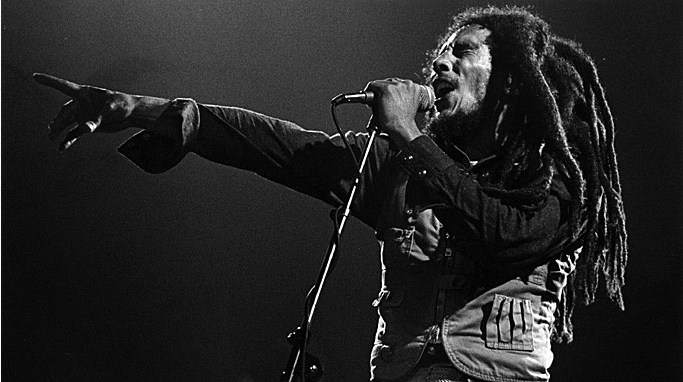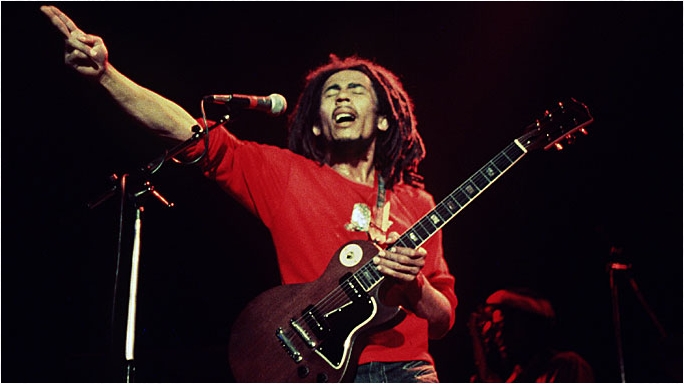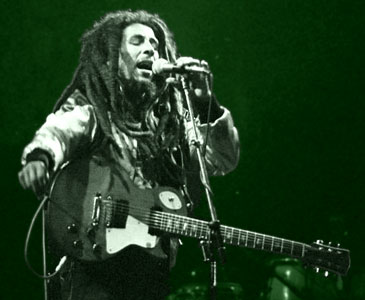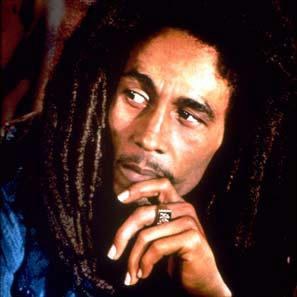BOB MARLEY / “Babylon System”
Our music is our emotional history, an exact documentation of our souls at any given moment in life’s timeline. What pressed us: impressed us, downpressed us, pressed our buttons, our clothes, pressed us into service, pressed us forward in struggle. Our music. Precisely.
 1979. Things were beginning to look grim. Really grim. Almost like we saw baby Bush coming cross-eyed at us. Bob Marley, who had been a strong hope, had previously released Kaya, an album of weed, women and song. Except there was a pressing need for something deeper, stronger.
We whispered to ourselves. What a come of this? Don’t nobody still be a luta-ing? (Referring to the slogan “a luta continua” – the struggle continues.)
I was so disappointed I did not even buy Kaya at first. Those were nice enough songs, but Bob, come on man, we need a stronger shout.
1979. Things were beginning to look grim. Really grim. Almost like we saw baby Bush coming cross-eyed at us. Bob Marley, who had been a strong hope, had previously released Kaya, an album of weed, women and song. Except there was a pressing need for something deeper, stronger.
We whispered to ourselves. What a come of this? Don’t nobody still be a luta-ing? (Referring to the slogan “a luta continua” – the struggle continues.)
I was so disappointed I did not even buy Kaya at first. Those were nice enough songs, but Bob, come on man, we need a stronger shout.
 So when Survival dropped, you could hear shouts of joy erupt from every ghetto all over the world. Finally we had something we could listen to from edge to hole and never get bored, never have to skip a track. Could sing and shout the lyrics, hum them subversive sentiments at work, and chuckle to ourselves 'cause when we all a moan and hum the devil don’t know what we talking about. And this time we not only suffer the conditions to sing about, now we had strong words to sing. "Babylon system is a vampire." Indeed. Seen?!
Surging songs of struggle. Even today, damn near thirty years later, we can take these lyrics and recite them out loud to someone. Not have to change a word and we will be bringing the noise. This is boldness.
There are a ton of great Marley songs, but there is no other album that is so strong through and through. Survival is the album for all the sufferers.
Here are five choice cuts (four actually because the fifth cut, “One Dub,” is a dub version not on the album even though it is a dub of “One Drop,” which was one of the tracks from Survival. "Babylon System" is at the top of my all time list of songs because of its incisive condemnation of the status crow. "So Much Trouble In The World" mirrored what I saw and confirmed that what I saw was real. I was not hallucinating. "Wake Up And Live" an exhortation to do more than settle for the anesthisa of consumer society trinkets and addicitons. "Survival" was, is, and always will be a personal anthem: naa-naa naa-naa naahhh, we're the survivors, the Black survivors! The aforementioned "One Dub" is an instrumental interlude, a swinging (correction, make that: skanking) hot stepper. Notice how Marley be using sounds as lyrics, knowing the limitations of the English language, knowing we have feelings the English language does not have words for, the makers of English don't want to hear, the sufferers under English need to articulate. Marley knows all that and fills his songs with wordless chants that articulate those urges within us that otherwise are shackled if we depend on dictionaries and proper English.
Not only was this album political, it is also the one with the strong horns and jazz solos.
But beyond the music and the lyrics, Survival is also the album which makes the boldest statement in its artwork. The lettering "survival" is reversed out of the graphic of a packed slaveship. The rest of the album cover is made up of the flags of 49 African countries. I remember when the album came out, we rushed down to record stores to get the poster, a blow up of the cover. Boy, Bob made us so proud.
Survival was a survival kit, shield, ammunition and armament. Everything forward music ought to be.
What was most amazing is that this came at a time when Bob was a world-wide phenomenon. Bob was being embraced everywhere he went. He could easily have laid back. Come out with “Four Little Birds,” lit a spliff and enjoyed the spoils of his enormous popularity. He could have. But he didn’t. Instead of blinging or blissing out, he came back harder than hard.
Survival.
So when Survival dropped, you could hear shouts of joy erupt from every ghetto all over the world. Finally we had something we could listen to from edge to hole and never get bored, never have to skip a track. Could sing and shout the lyrics, hum them subversive sentiments at work, and chuckle to ourselves 'cause when we all a moan and hum the devil don’t know what we talking about. And this time we not only suffer the conditions to sing about, now we had strong words to sing. "Babylon system is a vampire." Indeed. Seen?!
Surging songs of struggle. Even today, damn near thirty years later, we can take these lyrics and recite them out loud to someone. Not have to change a word and we will be bringing the noise. This is boldness.
There are a ton of great Marley songs, but there is no other album that is so strong through and through. Survival is the album for all the sufferers.
Here are five choice cuts (four actually because the fifth cut, “One Dub,” is a dub version not on the album even though it is a dub of “One Drop,” which was one of the tracks from Survival. "Babylon System" is at the top of my all time list of songs because of its incisive condemnation of the status crow. "So Much Trouble In The World" mirrored what I saw and confirmed that what I saw was real. I was not hallucinating. "Wake Up And Live" an exhortation to do more than settle for the anesthisa of consumer society trinkets and addicitons. "Survival" was, is, and always will be a personal anthem: naa-naa naa-naa naahhh, we're the survivors, the Black survivors! The aforementioned "One Dub" is an instrumental interlude, a swinging (correction, make that: skanking) hot stepper. Notice how Marley be using sounds as lyrics, knowing the limitations of the English language, knowing we have feelings the English language does not have words for, the makers of English don't want to hear, the sufferers under English need to articulate. Marley knows all that and fills his songs with wordless chants that articulate those urges within us that otherwise are shackled if we depend on dictionaries and proper English.
Not only was this album political, it is also the one with the strong horns and jazz solos.
But beyond the music and the lyrics, Survival is also the album which makes the boldest statement in its artwork. The lettering "survival" is reversed out of the graphic of a packed slaveship. The rest of the album cover is made up of the flags of 49 African countries. I remember when the album came out, we rushed down to record stores to get the poster, a blow up of the cover. Boy, Bob made us so proud.
Survival was a survival kit, shield, ammunition and armament. Everything forward music ought to be.
What was most amazing is that this came at a time when Bob was a world-wide phenomenon. Bob was being embraced everywhere he went. He could easily have laid back. Come out with “Four Little Birds,” lit a spliff and enjoyed the spoils of his enormous popularity. He could have. But he didn’t. Instead of blinging or blissing out, he came back harder than hard.
Survival.
 A true black-heart man. No sleeping lion. Natty Dread roared.
Give thanx. Bob you were just what we needed to keep on pushing. Thanks to you, surviving was made just a little easier.
—Kalamu ya Salaam
Survival and Kaya
Is Survival Bob Marley's best album? I'd probably have to say yes. The only album that I sometimes think of as better is 1974's Natty Dread. I think it says a lot about Bob's consistency that his two best albums are separated by six years and probably six or seven other albums. (I didn't check the discography; I'm just guessing.) What makes Survival so good? Kalamu did a good job of sketching out the socio-political importance of the album and I agree with all that he said. But what about the music? On Survival, Bob displayed a new-found density in his sound. By which I mean the music sounds sturdy, hard and unbreakable.
As Kalamu mentioned, Survival came on the heels of Kaya, an album that was probably the softest of Bob's career. Kaya sounds like an album that a man records when he knows the end is near. It sounds like the wistful humming you might hear from an old musician who knows the glory days are behind him. If Kaya is a pretty whisper, Survival is a thunderous roar. Even the slower, softer songs are hard. "Babylon System," the song Kalamu is featuring, is a good example. The groove is smooth and mellow. There are nature sounds in the background. It's a pretty record. But listen to what the man is saying! "Babylon system is the vampire / Sucking the blood of the sufferers / Tell the children the truth / Tell the children the truth right now!"
Did y'all know the original title of the Survival album was Black Survival? It was. Bob decided to change it because he didn't want people misunderstanding his point and thinking he was advocating that others not survive. That wasn't Bob's point. His point was that the continent of Africa (as well as Pan-Africans everywhere) was under attack and was being destroyed. He was advocating the unity and survival of Black people in Africa and all over the world. That was the meaning of the slave ship and the African flags on the cover. Black survival.
I've always been amazed by how many people listen to Bob Marley's songs without actually listening to his songs. The guys at work like to listen to a Classic Rock station while we're on the dock. Every night, the station plays a highly political Bob Marley song back-to-back with a hit record by Fleetwood Mac or the Eagles or somebody. I'm not knocking either Fleetwood Mac or the Eagles—honestly, "Dreams" is the shit—I'm just saying though. Anyway, the point is, I have never heard that station play a song from Survival and I know I never will. Reason is, Survival made it impossible to listen to Bob Marley without paying attention to what he was saying. There's something about the tightness of Bob's focus on this album, something about how relentless he was both musically (there are no ballads) and lyrically (there's not a single love song) that makes you know you're listening to some heavyweight political shit.
A true black-heart man. No sleeping lion. Natty Dread roared.
Give thanx. Bob you were just what we needed to keep on pushing. Thanks to you, surviving was made just a little easier.
—Kalamu ya Salaam
Survival and Kaya
Is Survival Bob Marley's best album? I'd probably have to say yes. The only album that I sometimes think of as better is 1974's Natty Dread. I think it says a lot about Bob's consistency that his two best albums are separated by six years and probably six or seven other albums. (I didn't check the discography; I'm just guessing.) What makes Survival so good? Kalamu did a good job of sketching out the socio-political importance of the album and I agree with all that he said. But what about the music? On Survival, Bob displayed a new-found density in his sound. By which I mean the music sounds sturdy, hard and unbreakable.
As Kalamu mentioned, Survival came on the heels of Kaya, an album that was probably the softest of Bob's career. Kaya sounds like an album that a man records when he knows the end is near. It sounds like the wistful humming you might hear from an old musician who knows the glory days are behind him. If Kaya is a pretty whisper, Survival is a thunderous roar. Even the slower, softer songs are hard. "Babylon System," the song Kalamu is featuring, is a good example. The groove is smooth and mellow. There are nature sounds in the background. It's a pretty record. But listen to what the man is saying! "Babylon system is the vampire / Sucking the blood of the sufferers / Tell the children the truth / Tell the children the truth right now!"
Did y'all know the original title of the Survival album was Black Survival? It was. Bob decided to change it because he didn't want people misunderstanding his point and thinking he was advocating that others not survive. That wasn't Bob's point. His point was that the continent of Africa (as well as Pan-Africans everywhere) was under attack and was being destroyed. He was advocating the unity and survival of Black people in Africa and all over the world. That was the meaning of the slave ship and the African flags on the cover. Black survival.
I've always been amazed by how many people listen to Bob Marley's songs without actually listening to his songs. The guys at work like to listen to a Classic Rock station while we're on the dock. Every night, the station plays a highly political Bob Marley song back-to-back with a hit record by Fleetwood Mac or the Eagles or somebody. I'm not knocking either Fleetwood Mac or the Eagles—honestly, "Dreams" is the shit—I'm just saying though. Anyway, the point is, I have never heard that station play a song from Survival and I know I never will. Reason is, Survival made it impossible to listen to Bob Marley without paying attention to what he was saying. There's something about the tightness of Bob's focus on this album, something about how relentless he was both musically (there are no ballads) and lyrically (there's not a single love song) that makes you know you're listening to some heavyweight political shit.
 It was as if Bob had a sudden shift in personality. On "Running Away," a song from Kaya, Bob uses a gentle, metaphorical and self-reflective tone to address the attempt on his life and his subsequent self-imposed exile from Jamaica. Maybe "Running Away" had nothing to do with Bob himself, but given that he had in fact just "run away" from his homeland, it's hard to see it any other way. Near the end of the song, Bob is singing so quietly that I imagine he must've had his mouth pressed right up against the microphone screen. "Got to protect my life," he sings. "And I don't want to live with no strife. ... I made my decision and I left you. And now you come to tell me that I'm running away. But it's not true."
One year later, on Survival, Bob revisited the subject on both the title track and more pointedly on "Ambush In The Night." This time, there were no metaphors. The chorus of "Ambush" goes:
It was as if Bob had a sudden shift in personality. On "Running Away," a song from Kaya, Bob uses a gentle, metaphorical and self-reflective tone to address the attempt on his life and his subsequent self-imposed exile from Jamaica. Maybe "Running Away" had nothing to do with Bob himself, but given that he had in fact just "run away" from his homeland, it's hard to see it any other way. Near the end of the song, Bob is singing so quietly that I imagine he must've had his mouth pressed right up against the microphone screen. "Got to protect my life," he sings. "And I don't want to live with no strife. ... I made my decision and I left you. And now you come to tell me that I'm running away. But it's not true."
One year later, on Survival, Bob revisited the subject on both the title track and more pointedly on "Ambush In The Night." This time, there were no metaphors. The chorus of "Ambush" goes:
Ambush in the night All guns aiming at me Ambush in the night They opened fire on me now Ambush in the night Protected by His MajestyAnd on "Survival," Bob dropped one of the great double-entendres of his career when he sang: "Some people got the plots and the schemes / Some people got no aim, it seems." In both songs, Bob was striking a defiant, fighting stance. He wasn't talking about "running" anywhere. He was back in Jamaica (literally and metaphorically), ready to face his enemies. One last thing and I'll bring this novel to a close. Kalamu can say whatever he wants about it, but I love the Kaya album. "Easy Skanking," "She's Gone," "Is This Love," the mystical "Time Will Tell." There's "Satisfy My Soul," with that wonderful line where Bob says his girl makes him "feel like a sweepstakes winner." "Misty Morning" is another great record. Hell, there really are no highlights 'cause the whole album is on point. I guess I feel the say way about Kaya as I feel about Charlie Hunter's Natty Dread. Maybe it's softer than the 'real' thing. Maybe it's simpler. And maybe I don't care. It's great music and I love it. —Mtume ya Salaam There's More Than One Kind Of Love I listened to the Charlie Hunter again and I actually like some of it ("Lively Up Yourself" and "Bend Down Low") but I'm not particularly interested in listening to it over and over. And as I said in the write-up about it, that's on me, not a knock against Charlie Hunter or the music he made. Which brings me to Kaya. You know I understand and even like some of the tunes on Kaya. How can anyone not dig some of those smooth, classic, mellow jams? But are those gentle tunes what we need now or needed then (back in the Seventies-turning-Eighties)? My answer is—surprise—yes. We need Kaya now and we needed Kaya songs back then. But the deal is that there was already an almost unlimited supply of them gentle-sounding kind of love songs. What was less forward was struggle music. We don't need ceaselessly to be encouraged to lay back. In critical times we need sounds to urge us forward. Let me put it in more controversial terms: as great as the body of Stevie Wonder's work is, and Stevie's music is undeniably great—he wrote some of the greatest love songs of all time—but where is Stevie's Survival album? Where is something fierce flung in the face of the oppressor? I don't think it's an accident we don't have much fist-in-the-air popular music produced by African Americans, especially when you look at the work of the most popular artists. Hell, part of being popular in America, is being generally considered safe. The American music industry does not like edgy music regardless of how it sells. When they did a Bob Marley greatest hits compilation called Legend, you know how many tunes from Survival they included? None. It's not that Survival didn't sell, it's just that... well, y'all know where this is going? So yes indeed, Kaya is hip. Is some sweet songs, yeah. But if Bob was going to go back to Jamaica and face his enemies (which is what Bob did) than Kaya was not enough to ensure his Survival. Seen? —Kalamu ya Salaam Why bring Stevie into this? Damn, Baba. I can't believe you brought Stevie into this. Stevie's Survival is a little something called Innervisions. I know you know this because I learned that music back at home. Back when we were kids, the entire album scared the hell out of me. I'm a grown man now and I still get a little unsettled listening to "Living For The City," "Too High" or "Jesus Children Of America." Come on, now. Which reminds me. One of these weeks, we gotta do a Stevie Wonder three-parter. Later.... —Mtume ya Salaam Because Stevie proves my point Innervisions is a wonderful statement but it's no Survival. I picked Stevie to bring into this because Stevie is unassailable in his greatness and because Stevie is a contemporary of Marley. Check Innervisions closely. Is it thru and thru a pointed political statement? No. The point you made ("scared the hell out of me") is what I'm addressing...negroes are afraid of revolution. Am I calling you a negro? No, I'm saying when it comes to politics the majority of us negroes are children, scared to fully face the reality of our situation. It's time we stop fooling ourselves about our conditions. We live in a racist, capitalist and sexist country that has a long and sordid history of violence and of bullying others including helping to destabilize Jamaica. So how is it that the little island of Jamaica produces giants like the honorable Marcus Garvey who put together the largest organization of African Americans in history and like the honorable Robert Nesta Marley who gave us the most militant popular recording of the 20th century? Because to achieve those levels of greatness you have to desire to burn down rather than sleep in the big White House. Our brothers and sisters around the world understand this reality, those of us here in the good ole USA who think "we're living in heaven" are really... you know how Marley's song goes. You know the reality of America. If Innervisions still unsettles you, what you think a daily dose of Survival will do to you? Facts is facts, Mtume. Let's not fool ourselves or pretend otherwise, when it comes to a militant, political statement Innervisions is no match for Survival. Period. —Kalamu ya Salaam
This entry was posted on Sunday, February 4th, 2007 at 12:42 am and is filed under Classic. You can follow any responses to this entry through the RSS 2.0 feed. You can leave a response, or trackback from your own site.
3 Responses to “BOB MARLEY / “Babylon System””
February 4th, 2007 at 3:50 am
I like this exchange. It was honest, open, and respectful. It brought out some real generational perspectives and tensions. I like that. Too often they are ignored and we over identify. It was very instructional.
Of course, I’m in Kalamu’s generation and he speaks my heart. He speaks that which we know from our own struggles from 1968 forward. Later generations have not fully soaked up that reality (those times and dreams) the urgency of the hour. I’m very pleased that Kalamu dropped down like he did and said what he said because it needed to be said. That edginess, that consciousness, is necessary, and necessary in these most disastrous times.
It was a wake up call. Wake up and Live!
February 5th, 2007 at 7:37 am
Of course, ‘Kaya’ famously followed on the heels of ‘Exodus’ and that is also a very heavy and interesting record. Biographically, Exodus and Kaya document the turmoil and emotional longing of Marley’s exile. The notion of Exodus is, for me, one of Marley’s most powerful and timeless themes. Survival seems to complete this trilogy with its militant, defiant stance set alongside his return to the homeland…
Leave a Reply
| top |